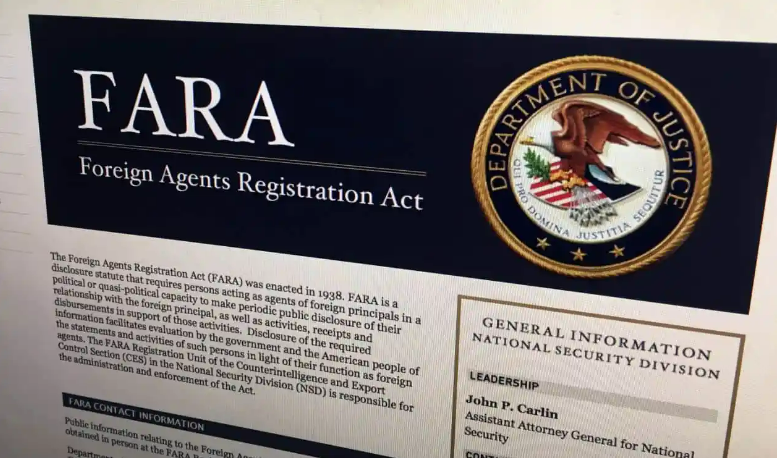
The Foreign Agents Registration Act (“FARA”) was passed in the Fall of 1938, largely in response NAZI party propagandizing in the years before World War II. Faced with First Amendment constraints, Congress instead created a set of disclosure regimes, determining those foreign propagandists could continue to hold peaceful rallies within the U.S., so long as they revealed who was behind them.
Broadly, FARA requires that an “agent” of a “foreign principal,” who is engaged in certain activities on behalf of that principal (generally called “political activities,”) register with the Department of Justice and file reports of their activity. With one exception—that nobody required to register under FARA can agree to any work on a contingent fee basis—the law is not prohibitive: if an agent properly registers and reports, they can go about their work. This seemingly simple obligation is, however, deceptively complicated.
First, it’s much broader than is commonly understood: Despite protestations from targets of federal investigations, FARA covers more than just lobbying, instead regulating “political activities”: work intended to influence either the U.S. government, or the U.S. public, concerning the political interests of any foreign nation. This includes public relations and political consulting, even where no outreach to the U.S. government occurs.
Even the term “agent” goes far beyond its standard usage in American law. Certainly, FARA includes the more common notions of agency (like those of employer-employee). But FARA also includes acting at the “order, request, or under the direction or control” of a principal. This breadth prompted the DOJ to release complicated informal guidance trying to define the word “request” and clarify exactly what sort of request would trigger registration.
Though FARA’s original purpose was largely to ferret out foreign government propagandists, the term “foreign principal” also includes foreign corporations, individuals, and associations. Because FARA applies to work conducted “directly or indirectly” for foreign principals, one could be hired by an intermediary, never encounter any foreign client, and still be subject to FARA.
Unlike other U.S. lobbying laws, there’s no compensation threshold or de minimis exception, so pro bono services aren’t exempt. Registration is required within ten days of simply agreeing to perform regulated services. This breadth creates, in essence, a trap for the unwary. You’re a PR firm representing a foreign leader on a book tour? FARA may apply. You’re a political consultant advising a foreign state-owned corporation on how to engage with the Biden administration? FARA may apply.
FARA is also poorly drafted. For example, whenever an agent disseminates propaganda for their principal, each copy must have a “conspicuous” disclaimer and one copy must be filed with DOJ within 48 hours. Except that the law no longer uses the word “propaganda,” referring instead to “informational materials,” a term which is curiously undefined in the law: FARA’s regulations note that “informational materials” may include “prints” and “motion pictures” and “broadcasts” and then, confoundingly, include materials that are “in any other form which is reasonably adapted to being, or which he believes will be, or which he intends to be, disseminated…” Is every email therefore an “informational material?” Every text message?
The law also contains a list of exemptions to registration, which contain vague and undefined terms. The law exempts certain “commercial activities” conducted for non-governmental principals, so long as the activity doesn’t “directly promote the public or political interests of the foreign government” and doesn’t serve “predominantly a foreign interest.” And yet there’s no clear definition, even in the regulations, of what it means to “directly promote” foreign governmental interests, and some advisory opinions from DOJ have been less than consistent on the topic. Putting ads in subways for a foreign tourism bureau directly promotes the public interests of a foreign nation because tourism drives tax revenue, but a PR firm arranging meetings for a foreign government with potential U.S. investors does not.
FARA has a specific exemption for some traditional lobbying: an agent engaged in federal lobbying for a private foreign client, whose lobbying is neither directed nor controlled by a foreign government or political party, and who has registered under the far less burdensome Lobbying Disclosure Act, is exempt from FARA so long as no principal beneficiary of the lobbying will be a foreign government. Though, trying to determine who a “principal” beneficiary of lobbying is, is no easy task. You’re a lobbyist representing a foreign trade association on international tariffs and cross-border tax issues? Will a foreign government receive a major benefit if your lobbying work succeeds? FARA may apply.
Another example, among the narrow exemptions, is the “legal” exemption: licensed attorneys who are engaged in certain core legal services for foreign clients may be exempt. But the law makes no mention of paralegals or new lawyers awaiting their bar exam results who are working under the direction of licensed attorneys—commonplace in modern law firms. Are they exempt?
Finally, the law isn’t well-suited to today’s influence campaigns. Many public affairs campaigns include a healthy dose of digital, and yet the law was drafted before television. Tweets count as informational materials, but the required disclaimer itself is over 160 characters in length. DOJ has had to release more informal guidance on what to do about social media campaigns, but informal guidance isn’t technically binding on either DOJ or registered agents. And the law always lags behind technological innovation.
Once the law is triggered, agents must disclose a significant amount of information about themselves, their clients, and their activities. At the outset, a copy of the contract with the foreign principal is filed publicly. A firm registering is required to disclose its corporate bylaws, names of directors/officers, and even the years of birth, citizenships, and home addresses of individuals who would be working on the client account. Every six months, the registered agent is required to disclose every contact on behalf of the foreign principal with the U.S. government and U.S. media, by date, method of contact, who was contacted, and the subject matter. Every penny received from the client must be disclosed, and every penny disbursed on the client’s account likewise becomes a matter of public record. All political contributions by registered agents —from dogcatcher up to the President—are up for public review. For many agencies, these disclosures can run hundreds of pages. Any changes to prior filings are due within 10 days, and as noted above informational materials need to have a disclaimer and be filed with DOJ within 48 hours. All of this can, and should, seem daunting to the advocacy industry—particularly smaller players breaking into the world of foreign clients.
So, what if you get it wrong? Civil enforcement actions, while rare, can be and (recently) have been brought by DOJ. Criminal indictments are also rare, not only because DOJ’s FARA Unit is under-resourced, but because the statute only provides for criminal sanctions in the case of willful violations of the law—a high prosecutorial burden.
DOJ certainly does conduct investigations short of litigation or prosecution, and many of those result in voluntary registrations. Prosecutors find their targets in a variety of ways: from public complaints; from the news; from other filings. It seems only natural, then, that given a broad mandate and limited resources, DOJ would pick its targets carefully: while FARA itself is foreign-nation-agnostic, it’s clear that some foreign actors receive more scrutiny than others; China was a hot topic for former A.G. Barr; Russian interests may be on the front burner now, but either is likely going to get more attention than Canadian publicly-traded companies engaged in commercial activity. Perhaps rightfully so.
For decades, the old-school FARA bar (small enough to squeeze around a conference table) had warned everyone who would listen that FARA was broader and more complicated than commonly understood and that enforcement would be coming. It was easy to assume FARA didn’t apply to you, or that you qualified for an exemption, or that you knew how to fill out the cumbersome paperwork, but the lawyers warned otherwise. After DOJ’s inspector general in 2016 called out lax and uneven enforcement of FARA, after Congress pressed (unsuccessfully, thus far) for reforms, and after FARA hit the mainstream in the wake of the indictments of Paul Manafort and Rick Gates in 2017, folks started to listen and DOJ redoubled its efforts to bring FARA into the spotlight. And enforcement, both formal and informal, has increased over the past five years. Registrations ticked upward. The FARA Unit grew.
The regulated community wants, largely, to comply with the law, but the fundamental problems of its language and scope are challenging, even for the lawyers who specialize in this area. Earlier this year, DOJ began the rulemaking process to address many of FARA’s shortcomings. It’s a welcome move, but only so much can be done via regulation.
FARA is an important law with lofty goals. Modernization and consistency are critical with any criminal statute, but perhaps more so with a national security law that’s in many ways confounding and fails to address how modern influence campaigns work. Foreign influence campaigns aren’t inherently evil, but FARA needs help bringing them to light.

Joshua Ian Rosenstein
Joshua Ian Rosenstein is a Member of Sandler Reiff Lamb Rosenstein & Birkenstock, P.C. He joined the firm in 2012 after a decade of both in-house and private practice in Washington, D.C. Mr. Rosenstein provides expert advice to non-profit and for-profit entities and individuals involved in politics on federal, state and local lobbyist regulations; FARA requirements; government ethics; and non-profit law. He also advises his clients on campaign finance, election law, contracts and commercial law, and related matters. He has designed in-depth compliance programs to clients in the advocacy arena through the complicated regulations governing the industry and has significant experience with lobbying related audits at the federal and state levels.






